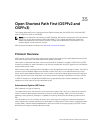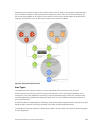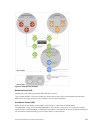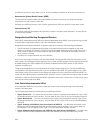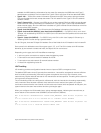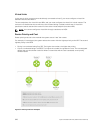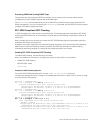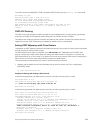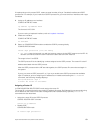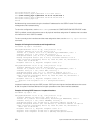
OSPF Implementation
The Dell Networking OS supports up to 10,000 OSPF routes for OSPFv2. Within the 10,000 routes, you
can designate up to 8,000 routes as external and up to 2,000 as inter/intra area routes.
Multiple OSPF processes (OSPF MP) are supported on OSPFv2 only; up to 32 simultaneous processes are
supported.
On OSPFv3, the system supports only one process at a time for all platforms.
OSPFv2 and OSPFv3 can coexist on a switch, but you must configure them individually.
The system supports stub areas, totally stub (no summary) and not so stubby areas (NSSAs) and supports
the following LSAs:
• Router (type 1)
• Network (type 2)
• Network Summary (type 3)
• AS Boundary (type 4)
• LSA(type 5)
• External LSA (type 7)
• Link LSA, OSPFv3 only (type 8)
• Opaque Link-Local (type 9)
• Grace LSA, OSPFv3 only (type 11)
Fast Convergence (OSPFv2, IPv4 Only)
Fast convergence allows you to define the speeds at which LSAs are originated and accepted, and reduce
OSPFv2 end-to-end convergence time.
The system allows you to accept and originate LSAs as soon as they are available to speed up route
information propagation.
NOTE: The faster the convergence, the more frequent the route calculations and updates. This
impacts CPU utilization and may impact adjacency stability in larger topologies.
Multi-Process OSPFv2 (IPv4 only)
Multi-process OSPF is supported only on OSPFv2 with IPv4 on the Z9500. Up to 32 OSPFv2 processes
are supported.
Multi-process OSPF allows multiple OSPFv2 processes on a single router. Multiple OSPFv2 processes
allow for isolating routing domains, supporting multiple route policies and priorities in different domains,
and creating smaller domains for easier management.
Each OSPFv2 process has a unique process ID and must have an associated router ID. There must be an
equal number of interfaces and must be in Layer-3 mode for the number of processes created. For
example, if you create five OSPFv2 processes on a system, there must be at least five interfaces assigned
in Layer 3 mode.
Each OSPFv2 process is independent. If one process loses adjacency, the other processes continue to
function.
Open Shortest Path First (OSPFv2 and OSPFv3)
627




